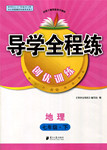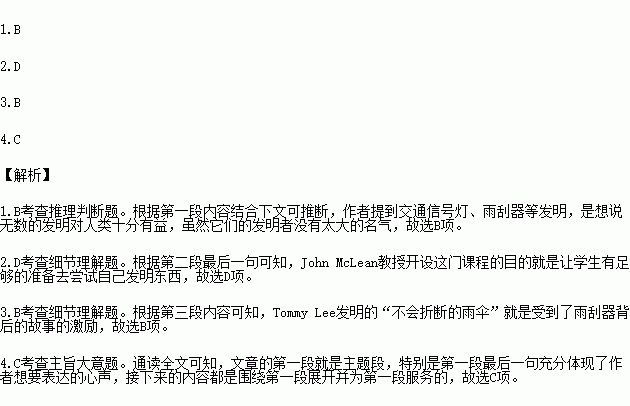题目内容
We know the famous ones--the Thomas Edisons and the Alexander Graham Bells --but what about the less famous inventors? What about the people who invented the traffic light and the windshield wiper (雨刮器) ? Shouldn’ t we know who they are?
Joan Mclean thinks so. In fact, Mclean, a professor of physics at Mountain University in Range, feels so strongly about this matter that she' s developed a course on the topic. In addition to learning "who" invented "what" , however, Mclean also likes her students to learn the answers to the "why" and "how" questions. According to Mclean, when students learn the answers to these questions, they are better prepared to recognize opportunities for inventing and more motivated to give inventing a try. "
Her students agree. One young man with a patent(专利)for an unbreakable umbrella is walking proof of McLean's statement. “If I had not heard the story of the windshield wiper’s invention,” said Tommy Lee, a senior physics major, “I never would have dreamed of turning my bad experience during a rain storm into something so constructive.” Lee is currently negotiating to sell his patent to an umbrella producer.
So, just what is the story behind the windshield wiper? Well, Mary Anderson came up with the idea in 1902 after a visit to New York City. The day was cold and stormy, but Anderson still wanted to see the sights, so she jumped aboard a streetcar. Noticing that the driver was struggling to see through the snow covering the windshield, she found herself wondering why there couldn' t be a built-in device for cleaning the window. Still wondering about this when she returned home to Birmingham, Alabama, Anderson started drafting out solutions. One of her ideas, a lever (操作杆) on the inside of a vehicle that would control an arm on the outside, became the first windshield wiper.
Today we benefit from countless inventions and innovations. It’s hard to imagine driving without Garrett A. Morgan' s traffic light. It’s equally impossible to picture a world without Katherine J. Blodgett' s innovation that makes glass invisible. Can you picture life without clear windows and eyeglasses?
1.By mentioning "traffic light" and "windshield wiper”, the author indicates that countless inventions are_______.
A. beneficial, because their inventors are famous
B. beneficial, though their inventors are less famous
C. not useful, because their inventors are less famous
D. not useful, though their inventors are famous
2.Professor Joan McLean’s course aims to _____.
A. add color and variety to students' campus life
B. inform students of the windshield wiper’s invention
C. carry out the requirements by Mountain University
D. prepare students to try their own invention
3.Tommy Lee' s invention of the unbreakable umbrella was _____
A. not eventually accepted by the umbrella producer
B .inspired by the story behind the windshield wiper
C. due to his dream of being caught in a rainstorm
D. not related to Professor Joan McLean' s lectures
4.Which of the following can best serve as the title of this passage?
A. How to Help Students to Sell Their Inventions to Producers?
B. How to Design a Built -in Device for Cleaning the Window?
C. Shouldn’t We Know Who Invented the Windshield Wiper?
D. Shouldn’t We Develop Invention Courses in Universities?
 导学全程练创优训练系列答案
导学全程练创优训练系列答案假如你住在一个涉外小区,社区请你帮忙根据以下提示用英文写一封电子邮件, 将周末社区邀请居民参加乡村耕作活动的细节传达给用户。
活动宗旨 | 亲近自然, 锻炼身体 |
参加人员 | 所有感兴趣的小区居民 |
内容 | 种菜, 养花, 喂鱼等 |
时间 | 本周六上午9:00—12:00(如果天气允许) |
地点 | 距离小区5千米的一家农场 |
出行方式 | 集体骑自行车前往 |
要求:1. 短文结构完整,意思连贯,语言流畅,语法准确,符合逻辑;
2. 100词左右;
3. 参考词汇:居民resident ; 社区 community
Hi,everyone!

